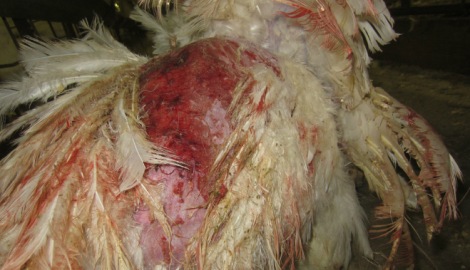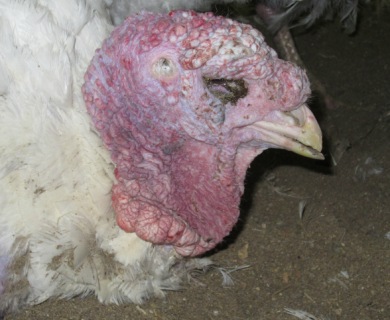Butterball’s poor training and pay for turkey farm workers is a ‘recipe for disaster,’ says Mercy for Animals

Butterball is “incapable of preventing egregious animal abuse at its factory farm facilities,” says animal protection group. / Photo: Mercy for Animals
By Katerina Lorenzatos Makris
“Butterball expects a few untrained workers to move thousands of crippled turkeys into transport trucks, and pays workers by the load, not the hour,” Mercy for Animals (MFA) Director of Investigations Matt Rice told Animal Policy Examiner in an email interview this week. [Please see full interview below.] “It is a recipe for disaster, and as our investigation proves, it results in horrific suffering for thousands of animals at the hands of Butterball workers.”
In October when MFA went back for a second, secret look at Butterball’s large-scale North Carolina turkey production facilities, their undercover investigator caught exactly the same types of severe abuses as during the first visit nearly a year ago, according to the group, which specializes in gathering covert video footage of animal cruelty on so-called “factory farms.”
On the most recent MFA video, workers are seen kicking, stomping on, and violently throwing turkeys. Many of the birds are filmed suffering and dying from severe, maggot-infested wounds and injuries with allegedly no veterinary care.
MFA’s first investigation resulted in one Butterball worker’s conviction on a felony animal cruelty charge, with several more cases against other workers pending.
In response to AIR’s questions about MFA’s allegations, a Butterball spokesperson said, “Upon learning of these new concerns, we immediately initiated an internal investigation and suspended the associates in question. Pending the completion of that investigation, Butterball will then make a determination on additional actions including immediate termination for those involved.” (Please see Butterball’s full statement.)
Butterball has not yet replied to follow-up questions from AIR.
AIR INTERVIEW WITH MATT RICE, MERCY FOR ANIMALS:
Animal Issues Reporter (AIR): What prompted MFA to go back to Butterball a second time?
Matt Rice: Butterball is the world’s largest producer of turkey meat and is responsible for nearly one-third of the turkeys raised and killed for Thanksgiving. We believe that consumers have a right to know how turkeys are treated before they end up as Thanksgiving dinner, so that they can make informed choices.
Mercy For Animals is encouraging people to end their financial support for Butterball this holiday season by carving out a new Thanksgiving tradition and digging in to any number of delicious vegetarian, turkey-free alternatives.
AIR: Why did you suspect that there would still be abuses going on there, despite the earlier conviction of a Butterball worker for felony cruelty?
Matt Rice: Mercy For Animals has conducted more than twenty undercover investigations into factory farms and slaughterhouses, and in every case we have documented horrific animal abuse. We didn’t suspect animal abuse was happening behind the closed doors of Butterball’s facilities. It was a given.
AIR: What do you believe the company should do to prevent abuse of its animals? Any specific recommendations?
Butterball has proven to be incapable of preventing egregious animal abuse at its factory farm facilities. Butterball should be held criminally accountable for the suffering the company routinely inflects on these animals.
AIR: Do you mean that the company itself should be charged/prosecuted? Or the company’s officers and/or managers?
Matt Rice: The company itself.
AIR: It seems it’s usually only workers who are charged in such cases. What would it take for criminal charges to go ‘to the top’?
Matt Rice: Sadly, it is all too easy and common for factory farming giants like Butterball to scapegoat a few employees, when it is obvious these abuses are a direct result of Butterball’s complete lack of animal welfare policies, training, or oversight.
On top of that, Butterball turkeys are purposely bred to grow unnaturally large, very quickly. Consequently, many of these birds are suffering from broken bones, crippling leg deformities and severe infections due to their breeding and filthy living conditions.
Then, Butterball expects a few untrained workers to move thousands of crippled turkeys into transport trucks, and pays workers by the load, not the hour. It is a recipe for disaster, and as our investigation proves, it results in horrific suffering for thousands of animals at the hands of Butterball workers.
While law enforcement may or may not be able to hold Butterball criminally accountable, concerned consumers can help end this needless cruelty and suffering by refusing to buy Butterball turkey.
AIR: This is part of Butterball’s statement in response to questions I sent them regarding MFA’s investigation: “When we learn of any instances of animal mistreatment we take immediate corrective action to suspend workers involved, conduct a swift investigation and terminate their employment with the company.”
It seems a key phrase there is “When we learn of…” Do you know of Butterball having learned of abuse of its animals through any way other than MFA’s undercover videos shot at their facilities? What do you believe the company could do to better monitor the problem?
Matt Rice: Butterball’s statement is nothing more than PR spin. This investigation graphically illustrates that Butterball fails to have meaningful animal welfare policies, training, or oversight to prevent blatant animal abuse and neglect at its factory farms. Butterball is guilty of extreme animal abuse and should be held criminally accountable.
AIR: Another part of Butterball’s response statement: “Butterball’s guidelines are based on guidelines developed by the National Turkey Federation that have been approved by animal well-being experts including Dr. Joy Mench at University of California at Davis, Dr. Janice Swanson from Michigan State University and Dr. Gail Golab at the American Veterinary Medical Association, among others.”
What is MFA’s opinion of those guidelines?

Butterball turkeys suffer and die from horrific wounds and injuries, receiving no veterinary care, says animal protection group
Matt Rice: More PR spin. Before ending up on Thanksgiving dinner plates, turkeys killed for Butterball are routinely crowded into filthy warehouses, left to die from festering, bloody wounds, and thrown, kicked, and beaten by factory farm workers.
AIR: Any info yet on whether or not there will be charges filed in this case?
Matt Rice: Following the investigation, MFA immediately went to law enforcement with extensive video footage and a detailed legal complaint outlining the culture of cruelty at Butterball. Law enforcement is investigating. It is too soon to say when charges will be filed.
AIR: Which counties would be the jurisdictions?
Matt Rice: Duplin, Onslow, Sampson and Lenoir counties in North Carolina.
More AIR on this topic:
Undercover video again catches Butterball workers severely abusing turkeys, says Mercy for Animals
Butterball workers suspended for allegedly abusing turkeys
Get fresh AIR! Hit the ‘Follow’ button above to be notified via email of new articles.
Katerina Lorenzatos Makris is a career journalist, author, and editor. Credits include hundreds of articles for regional wire services and for outlets such as National Geographic Traveler, The San Francisco Chronicle, Travelers’ Tales, NBC’s Petside.com, and Examiner.com (Animal Policy Examiner), a teleplay for CBS-TV, a short story for The Bark magazine, and 17 novels for Avon, E.P. Dutton, Simon and Schuster, and other major publishers.
Together with coauthor Shelley Frost, Katerina wrote a step-by-step guide for hands-on, in-the-trenches dog rescue, Your Adopted Dog: Everything You Need to Know About Rescuing and Caring for a Best Friend in Need (The Lyons Press).
Please respect copyright law. Sharing AIR links really helps! But copying more than a couple of paragraphs of content without permission is a no-no. If you’d like to use one of AIR’s articles or one of our photographs, kindly contact us at [airinfo AT yahoo DOT com].
Copyright © 2012 Animal Issues Reporter and AnimalIssuesReporter.org.
All rights reserved.
SACK THESE EVIL BASTARDS, MAKE SURE THEY NEVER EVER WORK WITH ANIMALS AGAIN. THEY HAVE TO BE PUNISHED SEVERLY OR THEY WILL CONTINUE WITH CRUELTY TO ALL ANIMALS.
bastards treat them like they treat the turkeys, no need for cruelty full stop
Corncrakecorncrakes are usually found in ntrohern Scotland.Habitat,damp meadows and hay fields.Dietinsects,seeds,leaves and shoots.Appearancelong neck,short stubby bill,greyish yellow brown feathers.Long legs,spread out feet and blueish grey head and tummy.Callit makes a sharp ehrp ehrp call noise mostly at dusk and dawn.
Reblogged this on SAVE OUR PRECIOUS ANIMALS.